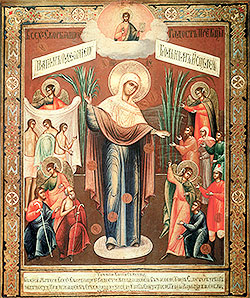Sermon of Bishop Irenei of London and Western Europe on the Feast of the Mother of God, ‘Joy of All Who Sorrow’
 In the Name of the Father, and of the Son, and of the Holy Spirit! Today, in this God-preserved temple dedicated to the Mother of our God, the ever-virgin Mary, on this splendid feast, I wish to ask a simple question: What does it mean for us to call the Theotokos the ‘Joy of all who sorrow’? This title, related to one of her most famous icons, to which this temple is dedicated, is itself a wonderful revelation. But what does it teach us? How should it inform our lives? In the Name of the Father, and of the Son, and of the Holy Spirit! Today, in this God-preserved temple dedicated to the Mother of our God, the ever-virgin Mary, on this splendid feast, I wish to ask a simple question: What does it mean for us to call the Theotokos the ‘Joy of all who sorrow’? This title, related to one of her most famous icons, to which this temple is dedicated, is itself a wonderful revelation. But what does it teach us? How should it inform our lives?
This world in which we live seeks joy in many places, from many sources. And it understands this thing for which it is searching — namely, joy — in various ways. It is sometimes understood as the emotion of happiness, or the feeling of contentment. Sometimes it is the fruit of satisfaction; at other times it is the thrill of gratification. And the pursuit of this goal becomes the object of so much of man’s focus and energy. He strives to create for himself the right circumstances for such joy: a freedom from anxieties, from want or need; an abundance of material comforts; the absence of conflict or struggles, and so on. In short, he seeks joy by fleeing what he perceives as its opposites — especially suffering or sorrow, in whatever their forms or however they might arrive.
But every man who engages in such pursuits eventually learns of their futility. Such joy is circumstantial: it depends on circumstances we create or coerce, and lasts only so long as those circumstances remain. But nothing in this life is eternal, and circumstances change. If we define joy by what we create, then our joy will always be temporary, and fragile, and fleeting. And worse still if we believe such joy to be an absence of sorrow or struggle; for every man must eventually confront the reality that suffering is inescapable in this fallen world. There is nowhere to hide from sorrow. None can escape the pains inflicted by a world that has been broken by human rebelliousness and pride. And it is the failure to understand these realities that leads to so much grief in the world, and even despair. Man is constantly seeking after something which ultimately will never satisfy him; he expends energy trying to avoid what cannot be avoided — and as a result, he finds himself further and further from the joy which he strives to obtain.
The Mother of God brings us a different kind of joy. This is the message of hope that the Church brings to us on this blessed feast day. She bears testimony to a joy that is different in character, and which we receive by following a very different path. Her title as the ‘joy of all who sorrow’ describes this path precisely, and must cause us to stop and reflect on the revelation of this unique, Christian testimony. For the Mother of God tells us that it is not by avoiding sorrows that we come to discover joy, but rather through the experience of our sorrows. We do not obtain joy by evading suffering: rather, it is suffering that brings us to the threshold of joy itself.
How can we understand this, in a modern world that views suffering with such fear and disdain? The Theotokos answers this question for us in the same way she always does: by pointing us towards her Son, our Lord and Saviour Jesus Christ. We come to her with our sorrows and struggles, and she guides us to Christ, Who teaches us how to bear them. And more, He shows us, through His own life, how suffering can become joy. It is, indeed, suffering that defines the Lord’s most visible act of our redemption: we even refer to His self-offering on the Cross as His ‘passion’. And this is an offering of struggle, of sorrow, most certainly. And its consequence is most dire: death itself. Yet Christ shows that beyond death there is life in Him, and that if we will bear our crosses with piety and hope, that even the most painful consequences we might obtain — even death itself — can become the means of obtaining a life in eternity with Him.
And this is the definition of true joy: not temporary gratification or satisfaction, whether it be material or emotional, but a life that never ends, united in love to God Himself, Who is the fount of love and grace. And the Mother of God is our constant reminder that this true joy can be the result of any circumstance — even the sorrowful ones — if only we will give those circumstances into the care of God, and offer our lives to Him. Then, she tells us, it will be the case that, however deep may be our sorrows, we will be sons and daughters of joy — for we will be joined to God Who is the source of joy forever.
May the Theotokos guide and help us, each and all, to seek and find this true joy. Amen!
|